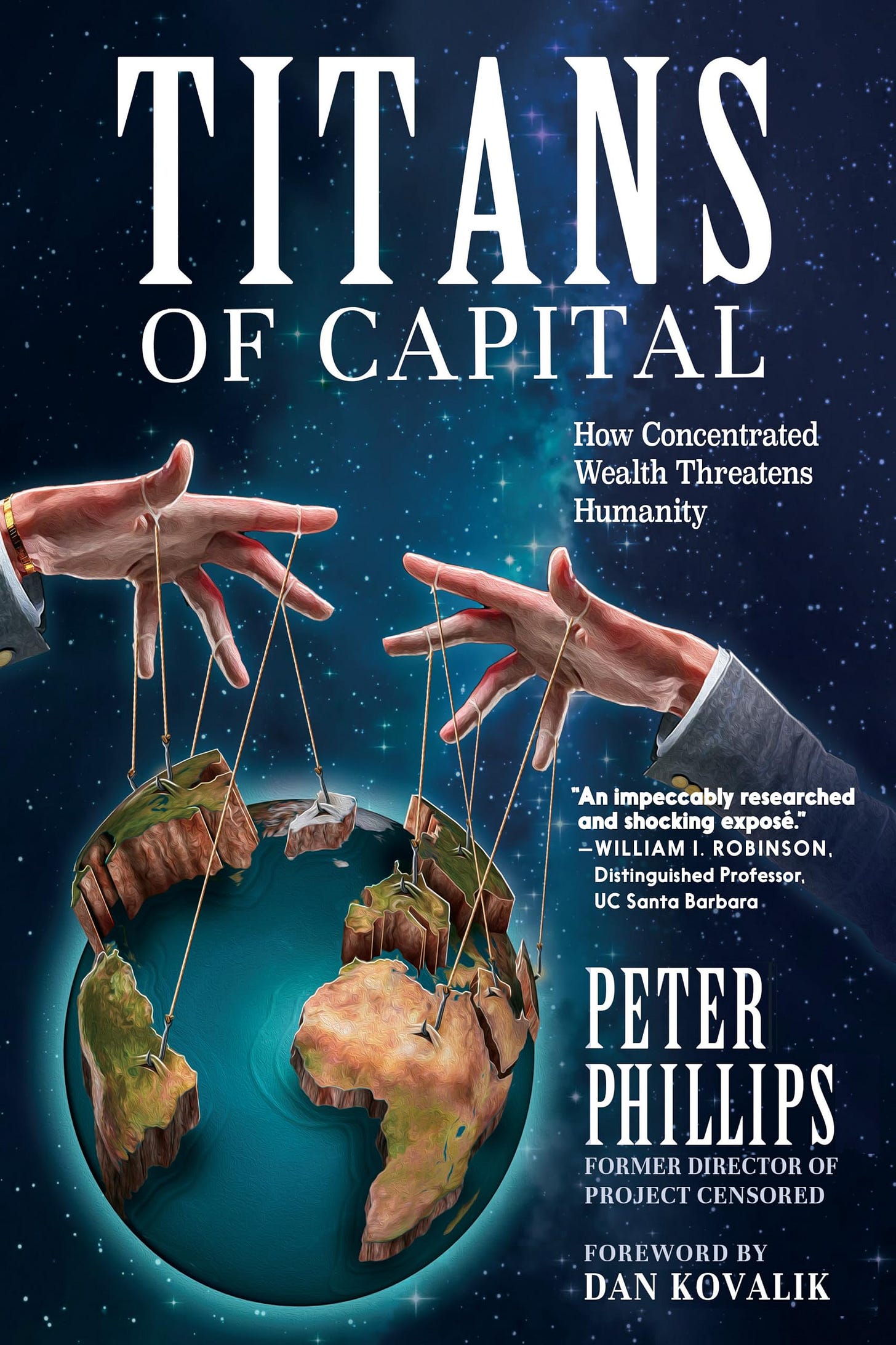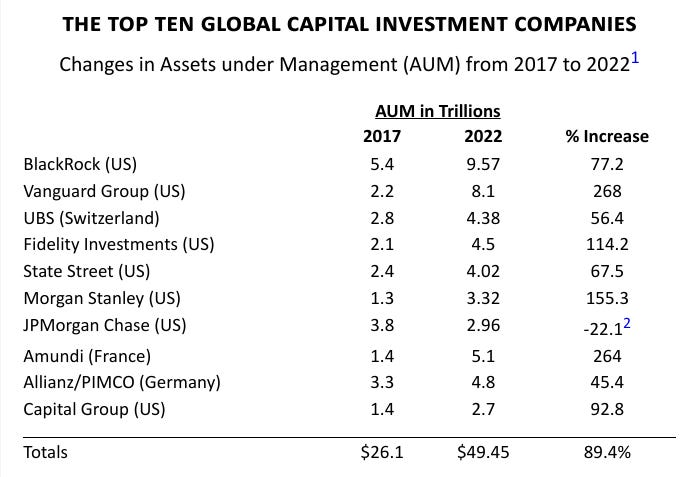Naming the Perp: Very Few People Cause All of the World's Worst Problems
Less than 800 Americans have wealth that counts. 100 others control where wealth is invested. That's a very small list.
We've written a lot in these pages about those with great wealth, people whom the writer Masaccio calls “the filthy rich.” This destructive group comes in two flavors: those who own great wealth, and those who invest it for them.
How is wealth distributed?
Here's a quick picture of those who own the most wealth in the U.S.:
To break this down, let’s look at American wealth in tiers:
The 17 richest people own $2.2 trillion (Forbes). Just 17 people.
The 400 richest own about $5.4 trillion (Forbes).
The 800 richest (includes all billionaires) own $6.2 trillion (source), twice the GDP of France.
The top 0.1% of Americans, about 131,000 households, own $21 trillion (Fed).
The top 1% of Americans, about 1.3 million households, own 30% of the wealth, or $46 trillion (Fed).
Everyone else splits the rest, about $100 trillion (Fed), divided among 130 million households, or 330 million souls. Those in the bottom 20% average about $14,000.
Let’s focus on the top individuals (the first three bullets above). Just 800 people control a neat $6 trillion. Those 800 people together could run the country, and probably do.
Those 800 are Americans. They have names and addresses. You could list them on a handful of pages in a small notebook.
How is wealth controlled?
What do those people do with their wealth? They give it to BlackRock, Vanguard, UBS, Fidelity, JPMorgan, and say, “Go make some more.”
According to a new book, Titans of Capital by Peter Phillips, here’s what the global rich do with most of their wealth (emphasis mine):
The global richest .05 percent represents some 40 million people, including more than 36 million millionaires and 2,600 billionaires, who turn over their excess capital to investment management firms like BlackRock and JPMorgan Chase. The top ten of these firms together controlled close to $50 trillion in 2023. These firms are managed by the 117 people identified below. The top ten capital investment companies extensively cross-invest in each other. Cross-investments between the top ten firms amounted to $320.52 billion in 2022. Cross-investment practices imply a close monitoring of each other’s policies and a commonality of mutual interests in market maintenance and growth.
The 117 Titans decide how and where global capital will be invested.
The top ten wealth investment firms are these:
So, 800 Americans, all of them with names, own the most concentrated $6 trillion dollars in our political economy. And an even smaller number, 117 folks, also with names, control where more than $50 trillion will be invested. (Note: There’s not much overlap between these two groups — people with personal wealth vs. those with wealth under management — but each has enormous power.)
Phillips’ book lists those 117 names. Here’s two of the BlackRock directors:
The key for the abbreviations above:
Fascinating. From this we learn that a human named Larry Fink, a living breathing man, is a trustee of Davos (the World Economics Forum), a director at the Council of Foreign Relations (CFR), and a trustee of New York University, where I’m sure his views are honored. Fink is not a machine or an organization. He’s an actual person, just like the rest of us.
All 117 of Phillip’s Titans have bios like these, wonderfully specific. If you have the searchable ebook version, you can make all sorts of discoveries.
I learned, for example, that Scott Malpass, a director at Vanguard, until recently sat on the board of the $15 billion endowment fund at Notre Dame (my alma mater) and received $4.8 million in 2020 compensation from the university. I wonder what his views on the slaughter in Gaza are, and whether they count.
The Perp List is concentrated; not a bad thing
Why do I mention that all these people have names? Because we lose track of the fact that most of what’s wrong in our world is caused by very few people, folks just like ourselves, with names and addresses, bodies, minds and souls, fears and desires, heart trouble and secret sins — and way too much money and power to deploy as they wish.
A machine’s not in charge of the world; it’s a small group of humans destroying the rest of us. Humans that can be approached. For example, this is Ted Cruz confronted at a restaurant in 2018:
Video here. Brett Kavanaugh got similar treatment in 2022.
But Kavanaugh and Cruz are puppets. They mostly do what they’re told. The CFO of Saudi Aramco is much more deserving (video at the link):
Climate Defiance is a good Twitter feed, by the way.
Slowing our Stone Age and poverty-ridden future
Do this a dozen times and it’s a nuisance. (Make sure you get publicity.) Do this a hundred times, to the same woman or man … and you might make it hard for a conscienceless murdering thief to show up in public.
Why should a criminal like this dine on glory and praise if he’s killing us back at the office? Ignore the shy smile; the Aramco man is a monster, not someone to fête.
Just wanted to point this out. Following the “name the perp” principle, these are the perps. Eight hundred people or less.
The fact that all this evil — I swear to you, after the climate crisis hits home, we’ll be back in the Stone Age again — the fact that this evil flows from just a few souls may be an advantage, if you really want to change course or slow the descent.











Saudi Aramco is not close to the biggest polluter on the planet.
That prize goes to the US military.
name and shame while we still have the chance b/c our way of life is ephemeral, as ppl in WNC recently found out.
the stone age (or, at least the 19th century) is one EMP away—or CME for that matter. imagine all electronics and comms gone; how insanely lost most would be. i know i would.
mentioning this b/c these 117 already have their bunkers. some are even trying to sell shipping containers (as bunkers) to the rest of us. as one of my lit profs used to say, “what are portents?” that’ll tell you where the story is going.